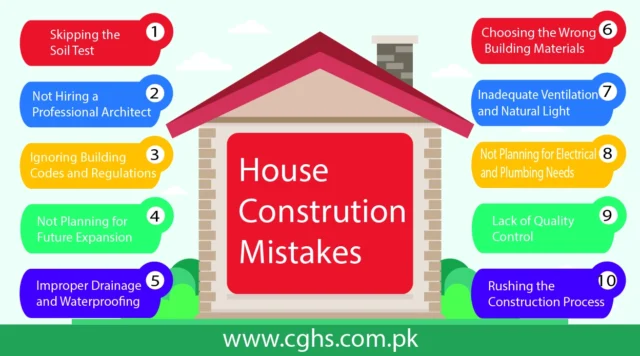Building a house is a major investment and it’s essential to ensure that the construction process is done correctly. In Pakistan, there are several common mistakes that people make during the house construction process. Consequently, they can lead to significant issues in the future. In this article, we’ll discuss ten house construction mistakes to avoid in Pakistan.
1. Skipping the Soil Test
Before construction begins, it’s crucial to perform a soil test to determine the quality of the soil. Many people in Pakistan skip this crucial step, which can lead to foundation issues in the future. The soil test will reveal important information about the soil’s bearing capacity, which will help determine the appropriate foundation design for your house. Different types of soils have different load-bearing capacities. So it is important to get the soil tested to ensure the foundation of your house is strong enough to hold the weight of your house.
Here is the list of companies for reliable soil testing in Pakistan:
Not Hiring a Professional Architect
Another common house construction mistake people make is not hiring a professional architect. An architect will ensure that the design of the house is structurally sound, aesthetically pleasing, and meets all local building codes. A professional architect will also take into account the climate and environmental factors to design a house that is energy-efficient and comfortable.
By working with an architect, you can avoid common design mistakes such as awkward room layouts or poorly placed windows. They will also provide you with a detailed plan that will include drawings and specifications of the construction work to be carried out. This will help ensure that your construction project is carried out smoothly and without any costly mistakes.
3. Ignoring Building Codes and Regulations
Building codes and regulations exist to ensure that buildings are safe and meet certain standards. Ignoring these codes and regulations can lead to safety hazards, legal issues, and even the demolition of the building. It’s crucial to work with a professional who is familiar with the local building codes and regulations.
Each province in Pakistan has its own building codes and regulations, so it is important to make sure that the architect and the contractor are aware of these codes and regulations. This will help ensure that the construction of your house is carried out in compliance with the relevant codes and regulations.

4. Not Planning for Future Expansion
Many people in Pakistan build a house without considering future expansion. This can lead to the need for costly renovations in the future when the family grows or when more space is needed. It’s important to plan for future expansion during the design phase so the house can easily be modified in the future.
To avoid this construction mistake, it is important to consider the size of your family and plan the house design accordingly. You can also plan for extra rooms or spaces that can be easily converted into living areas or bedrooms when needed. This will help ensure that your house is flexible and can adapt to your changing needs.
5. Improper Drainage and Waterproofing
Pakistan is known for its monsoon season, and proper drainage and waterproofing are essential to prevent water damage. Many people make the mistake of not properly grading the land or installing proper drainage, which can lead to flooding and water damage. Waterproofing is also essential to prevent water seepage through walls and floors.
To avoid this mistake, it is important to hire a professional contractor who is experienced in drainage and waterproofing systems. They can design a system that will ensure that your house is protected from water damage.
6. Choosing the Wrong Building Materials
Choosing the right building materials is crucial to ensure the longevity and safety of the house. Many people in Pakistan opt for cheaper materials, which can compromise the structural integrity of the house. It’s important to work with a professional who can recommend the appropriate materials based on the local climate and environmental factors.
For example, in coastal areas where saltwater is prevalent, using steel reinforcement can lead to corrosion and compromise the structural integrity of the house. In such cases, it’s recommended to use stainless steel reinforcement instead. Similarly, using the wrong type of bricks or blocks can lead to issues such as cracking or crumbling of the walls.
7. Inadequate Ventilation and Natural Light
Proper ventilation and natural light are essential for the health and comfort of the occupants of the house. Many people in Pakistan make the mistake of not providing adequate ventilation or natural light in their houses. This can lead to problems such as mold, moisture build-up, and poor indoor air quality.
To avoid this mistake, it’s important to design the house with proper ventilation and natural light in mind. This can include features such as windows, skylights, and exhaust fans. It’s also important to ensure that the house has adequate air circulation to prevent moisture build-up and improve indoor air quality.
8. Not Planning for Electrical and Plumbing Needs
Another common mistake people make is not planning for their electrical and plumbing needs. This can lead to issues such as overloaded circuits, insufficient water pressure, or inadequate hot water supply. It’s important to plan for these needs during the design phase of the house.
That’s why, it’s important to work with a professional contractor who can design and install the electrical and plumbing systems based on your specific needs. This can include features such as energy-efficient lighting and appliances, water-saving fixtures, and a well-designed sewage system.
9. Lack of Quality Control
Maintaining quality control is essential to ensure that the work is carried out according to the plan and specifications. Many people in Pakistan do not monitor the construction work to ensure that the work is being carried out correctly. This can lead to poor workmanship and costly mistakes.
To prevent this flaw, it’s important to work with a contractor who has a good reputation and experience in quality control. You can also hire a professional inspector to monitor the construction work and ensure that it is being carried out correctly.
10. Rushing the Construction Process
Finally, one of the most common mistakes people make is rushing the construction process. This can lead to cutting corners, poor workmanship, and costly mistakes. It’s important to understand that building a house is a complex process that requires careful planning and execution.
So, it’s important to work with a professional who can provide a realistic timeline for the construction process. Rushing the construction process can also lead to safety hazards for the workers, so it’s important to prioritize safety and quality over speed.
Conclusion
In conclusion, building a house requires careful planning, attention to detail, and working with professionals who have experience and expertise in house construction. By avoiding these ten common mistakes, you can ensure that your house is safe, comfortable, and built to last. Always remember to hire a professional architect and contractor, plan for future expansion, follow local building codes and regulations, and prioritize safety and quality throughout the construction process.

